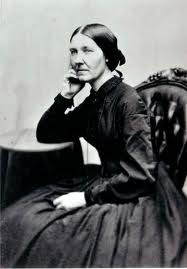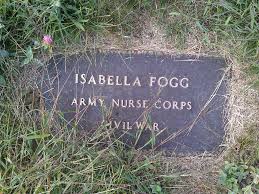 Maine Patriot, Isabella Fogg, was not only a Union Angel of Mercy, but also one of many unsung heroines that followed, nursed and supported Federal Troops during the Civil War. Depending on who you asked, she was an “angel of mercy,” according to Maine war hero Joshua Lawrence Chamberlain, or “a meddling pest, doing ten times the harm that she does good,” according to a less charitable officer. The air around her was rife with the feathers she ruffled, even as she bestowed tender mercies on the afflicted. Chamberlain described his Maine Angel best, when he wrote,
Maine Patriot, Isabella Fogg, was not only a Union Angel of Mercy, but also one of many unsung heroines that followed, nursed and supported Federal Troops during the Civil War. Depending on who you asked, she was an “angel of mercy,” according to Maine war hero Joshua Lawrence Chamberlain, or “a meddling pest, doing ten times the harm that she does good,” according to a less charitable officer. The air around her was rife with the feathers she ruffled, even as she bestowed tender mercies on the afflicted. Chamberlain described his Maine Angel best, when he wrote,
“I consider Mrs. Fogg one of the most faithful, earnest, and efficient workers in the humane cause in which she has been engaged for the last 3 years that I have ever seen in the field.”
Isabella Morrison, was born in 1823, her parents had emigrated to New Brunswick from Scotland before Isabella’s birth. A child bride, she married William Fogg of Calais, Maine in 1837, Isabella crossed the St. Croix River to live in Maine and have three children, including a son named Hugh Morrison Fogg.
Widowed by 1860, Isabella Fogg apparently doted on Hugh, possibly her only child to survive. Mother and son likely watched as Calais-area militiamen formed Co. D, 6th Maine Infantry Regiment. Electing Joel Haycock as captain and Reuel Furlong and Henry Waite as lieutenants, the Calais boys, including 18-year-old Private Hugh Fogg, boarded the steamer “Queen” at Calais on Tuesday, May 21 and sailed downriver to Eastport to join other Washington County militia companies headed to war with the 6th Maine. After her son enlisted, Mrs. Fogg thought her duty no longer obscure, and offered her services, without compensation, to the governor and surgeon-general of the state, and under their direction spent several weeks in preparing and collecting sanitary and hospital stores.
Isabella Fogg, who supported herself as a seamstress, was one of the first Maine women to volunteer as a nurse for Maine soldiers. After spending several months in Washington D.C. in 1861 and 1862 nursing fever-ridden soldiers, she returned to Maine to request more supplies and support for her efforts.
Early in May of 1862, came the first bloodshed on the Peninsula. The mutilated heroes of Williamsburg were brought in to the northern hospitals, on the Elm City; and a shudder of horror and agony ran over the nation. Isabella began to see the fearful price by which the Union was to be redeemed. Mrs. Fogg was now more anxious than ever to be constantly and actively employed in labors to assuage sufferings so immense as were likely to be the price of captured Richmond. Hastening to Washington, she placed herself under the direction of the Sanitary Commission, and when the Elm City returned she went, in company with several other ladies, and some gentlemen of the Christian and Sanitary Commissions, to labor on the hospital transports in the York and James Rivers.
On the last day of May came the bloody battle of Fair Oaks, after which there was a broad and unbroken stream of the wounded and the sick pouring steadily to the rear from the Chickahominy and around Richmond. The charge of these removals was in the hands of Dr. Swinburne, who, observing the skill and activity of Mrs. Fogg in attending those who were brought on the cars to the White House, asked her if she would be willing to go up to the front and labor.
A branch of the Sanitary Commission was accordingly established at Savage Station, where Mrs. Fogg labored throughout the day, protecting herself from sunstroke by a wet towel, worn in her hat, distributing cooling drinks, food, and stimulants to the sick, as they arrived in long trains from Fair Oaks. Just before the campaign culminated in the seven days’ fight, her son came down to Savage Station, and gave a moving account of the sufferings of his comrades at the extreme front, where he was stationed. The next morning found Mrs. Fogg in an ambulance, loaded with supplies for her Maine Boys, making her way to the front, within sight of the of the rebel capital.
On reaching the camp of the Sixth Maine, which was in Hancock’s brigade of Smith’s division, she found from sixty to seventy brave fellows, who, though sick, had refused to be sent to the brigade hospital, partly from the soldier’s dislike of all hospitals as long as he can stand, but mainly because they hoped to be well enough to march through the streets of Richmond, which they confidently expected that great army, then having nearly one hundred and twenty thousand men fit for duty, would enter in a few days.
When McClellan was repulsed at the gates of Richmond, Fogg “remained at her post until the last moment” while “ministering to the wounded until the last [wagon] load had been dispatched,” then Isabella sensibly fled.
Returning to Maine and ending her affiliation with the U.S. Sanitary Commission, Fogg filed detailed reports about the primitive medical care the ill and wounded Maine men received in Virginia. Those reports, plus many letters received from surviving soldiers, convinced state officials to establish the Maine Soldiers’ Relief Agency and appoint Col. John Hathaway at its commander. The agency set up shop at 273 F Street in Washington, D.C.
After the Battle of Antietam, on November 1, 1862, Isabella Fogg and Harriet Eaton of the Association, together with Charles C. Hayes of the Agency, set out for Sharpsburg, Maryland, to help “her Maine boys” who had fallen at Antietam. Almost two months after the battle was fought, the hospital grounds had deteriorated to the point that she was “horrified to find sick and wounded soldiers, supposedly long since removed, still languishing all over the area.”
Reaching the village, they discovered 20 badly injured soldiers of the 5th Maine “left in a school-house in care of a steward, without supplies; found him making every effort to keep them comfortable.” The Maine women repeated their promise to contact the agency for much-needed supplies.
Fogg and her companions ran into difficulties with the U.S. Sanitary Commission, which they felt ought to have had the situation under control for many weeks. Nevertheless they pressed on, distributing whatever supplies they could find to the soldiers. The journey continued to other field hospitals at Sharpsburg, Berlin, Harper’s Ferry, Keedysville and eventually Hagerstown.
She was not done caring for ill and injured Maine men, to her nurse’s resume Isabella Fogg would add assignments at field hospitals in Fredericksburg, Chancellorsville, and Gettysburg. While criticized by many people, Fogg later included in her admirers such Union generals as Ulysses S. Grant, George G. Meade, and Maine’s favorite son, Joshua L. Chamberlain.
Isabella Fogg was assigned to the hospital ship Jacob Strader on the Ohio River. While on duty on this boat in January, 1865, Isabella Fogg accidentally fell through an open hatch, permanently injuring her spine. Officers of the Army of the Potomac, including Generals Meade, Grant and Chamberlain were instrumental in seeing that Fogg receive a federal pension for her dedicated service during the war.
She spent the next two years in and out of Union hospitals. She recovered sufficiently to work at the U.S. Pension Office in Washington, D.C. which supplemented her own pension.
In her diary Isabella and a biographer relate,
“Her son was a cripple for life. She would never enjoy health again. But, to use the language of her diary, she is daily solaced and penetrated with deep gratitude to God that he so long preserved her in health and strength, to witness the triumph of the right, and the dawn of peace, and the days when the patriot, no longer languishing in the field, will not suffer for what woman, in her tenderness, can do for him.”
 Fogg died in 1873 of an intestinal disorder likely contracted during the war. She is buried in Maine. In 1994, a plaque was dedicated in her honor.
Fogg died in 1873 of an intestinal disorder likely contracted during the war. She is buried in Maine. In 1994, a plaque was dedicated in her honor.
Isabella Fogg was so much more than just a Maine Patriot or a Union Angel of Mercy, she epitomized the grit and stalwart character of so many women of the Civil War era and an example of a bona fide Unsung Heroine.
Bummer

